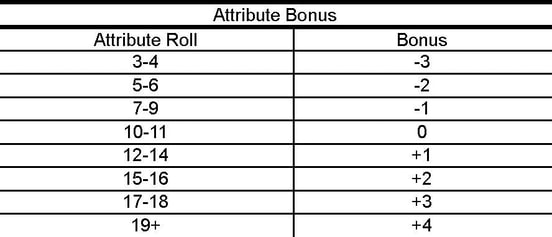What are you playing at? Isn't the WHOLE POINT of White Box that it frees you up from rules to make rulings, to play things 'by ear' and improvise, to resolve things through role-playing rather than roll-playing???
FILLABLE PDF CHARACTER SHEET
|
| ||||||
I know, I know, but hear me out!
These rules have come about in a particular context. I'm running a RPG online and, frankly, I find there's quite a cognitive load to that. It's harder to be attentive to players, pick up on their engagement, catch their questions and remarks and balance time between them all. Stuff that would be delivered through conversation and improvisation needs to be systematised, if only so that players can take some ownership of it and monitor stuff themselves. Also, I'm referee-ing a big mega-dungeon, which imposes different demands from the freewheeling and organic narratives I'm used to.
Attributes
In Expanded Lore, Syzmon Piecha suggests a more finely gradated set of Attribute bonuses than the simple +1/-1 used in White Box. I agree with this but I think his spread of scores needs balancing like this:
Helmets
The White Box character sheet has a spot next to AC for 'Helmet'. I allow a (10gp) helmet to add +1 to AAC (-1 to DAC) if the character is wearing chain or plate mail. The helmet may be destroyed if the character suffers a Lethal attack to the head, canceling out the Lethality die and Trauma from the attack.
Death & Dismemberment
These rules keep PCs alive, but at a cost.
There's a view that a OSR game like White Box ought to involve a high PC turnover: you create characters, they die, you create new characters; eventually, through a sort of Darwinian process, some make it to higher levels. Moreover, each PC recruits a mob of hirelings, so the party is a massive armed gang. If one character dies, you just shift to playing another one of your 'posse'.
That sounds like an interesting experience and I'd like to try it some time. But it's not what I want just now. It's enough work to keep track of each player's single character. Once we're all back round the table again we can try out the 'legion of flimsies' style of play.
If I want each player to play a single character and invest in it, then that character needs to be robust. Arnold Kemp's 'Death & Dismemberment' rules stave off actual death, especially for low level characters, and inflict debilitating injuries instead. The build up of these Injuries sends a signal: it's time to retreat from the dungeon. The scale of the Injuries helps players appreciate what they have endured and permanent scars and maimings remain as reminders.
Trauma & Derangement
Arnold Kemp's Trauma rules are an essential companion to the 'Death & Dismemberment' rules. If characters can stave off physical death, something else needs to set a 'timer' on how far they can push their luck in the dungeon. The accrual of Trauma serves to do this, threatening Breakdowns that are at best inconvenient and at worst endangering. Derangements make characters less functional in a dungeon setting. It's time to retreat.
The Trauma rules do something else, which is establish tone. Big mega-dungeons like Stonehell are oppressive. The relentless build up of Trauma represents the psychological grind of staying in such places, the shredding of nerves and the fraying of wits. In a round-the-table game we could manage this with a light-touch approach, but with online RPGs I need to give the players a mechanic they can manage themselves.
City Downtime
Around the table, we'd just roleplay the heck out of City Adventures. But this sort of fluid, emergent storytelling is difficult to do online - or at least, I find it difficult. Moreover, I want the focus here to be the mega-dungeon. The dungeon is king.
But of course, players need to go to the Big City, if only because money is burning a hole in their pockets. The choices about how we spend Downtime is another aspect of roleplaying. As above, I want to mechanise this aspect of the game so that I can hand it over to the players and let them make choices and roll dice without my direct supervision. If the results are intriguing, we can switch to narrative roleplaying and explore them.
Psionics
I don't know if I'm even going to use these house rules, but I figure they were there in Original D&D so they deserve to be at least an optiopn in White Box.


